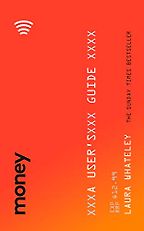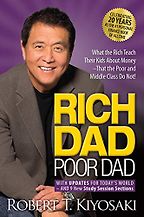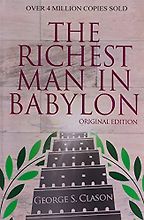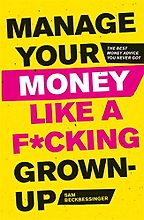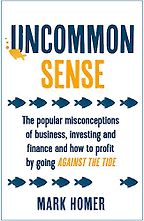Your first pick of the best finance books for teens and young adults is Money: A User’s Guide by Laura Whateley, an award-winning journalist. There are distinct editions for the UK and the US, which is helpful because although the underlying concepts are the same, some of the terminology is different. What do you think young people can learn from it?
It’s very applied and up to date. It’s targeted to young people, millennials and gen Z. It has a colourful, vibrant cover and none of the cobwebby feel that finance books sometimes have. Instead, it has all the things for the modern world, like online banking. It shows you how—when you’re sold this, that and the other—to look underneath the cover at what is actually happening. It gives you the journey from student loans all the way through to pensions and investments. What this book does really well is to open the doors to all of those areas: it doesn’t go deep into it, but it does definitely open the doors.
It shows people that you don’t need to be a rocket scientist to be an investor. This book is spot on with the technicalities and I want to get it for all my students. I deliver a London Institute of Banking & Finance course, and this book complements it well. It’s relevant and is driven by the real world.
I would recommend it to anyone from 16 upwards. 16 year olds tend to start banking, so the section on banking is ideal. In the journey of life from 16 to 24 this book is pretty important, because if they start looking at mortgages then it is also a really good starting point, it gives a kind of roadmap.
This book really speaks to young people. The author is very clear that you don’t have to be rich or good at maths to learn the fundamentals of finance, you just need to spend a few hours reading.
This book is big on life hacks and the benefits of technology as well. A few decades ago investing was much more expensive, but that has really changed in the last twenty years or so.
Your second pick of the best finance books for teens and young adults is Rich Dad Poor Dad by Robert T. Kiyosaki. This author seems judgmental about people who work all their lives for a living, using vocabulary such as “small people”. Why did you pick it?
This book was a change maker for me, personally. I had been a teacher, had just done an MBA and started a new highly paid job in London. I was starting to read self help books like How to Win Friends and Influence People by Dale Carnegie, and I came across Rich Dad Poor Dad when I was trying to find out more about money. As soon as I went to work in the City I had bought myself a car on a loan. I was being influenced, I was driving a car that I didn’t really feel I deserved – that feeling probably comes from my working-class background. This book changed the way I went about things. Within four months of reading Rich Dad Poor Dad I had sold the car back and paid off the loan because I realised that I was just increasing my liabilities. The rich dad makes sure he has assets that create cash flow, whereas the poor dad works for a living continually and is always chasing money because of inflation.
“I’m a big advocate of financial education”
Kids do need a bit of coaching with this book, but it helps them look at what an asset is, and what a liability is. For example, they will understand the difference between owning a house where you will maybe make money over time, and owning a rental property that gives you an income which you then use to build your assets and reduce any liabilities that you had. It is repetitive, but young people will get the fundamentals about using income, using the cash flow from surplus income to further build their assets. I changed my way of life, and this book is what moved the compass. It got me to where I am now, where I invest heavily in things that I ensure create cash flow.
Your third pick of the best finance books for teens and young adults is The Richest Man in Babylon by George S. Clason. It’s a compilation of pamphlets about thrift and financial success presented as parables from ancient Babylon.
This book was suggested to me when I wanted to get more involved in investing and setting up my own business. From this book, I share the 10% rule with my students all the time. No matter how small or how big the amount you earn, it’s important that you find a way of keeping 10% of it. There comes a point if you are earning more when it doesn’t have to be 10%, it can become 15% or 50%. The most important thing here is to start saving, the impact is psychological.
This book was published nearly a century ago but much of the content has stayed relevant. It covers compounding, the importance of long-term investment vision, not to confuse necessary expenses with desires or putting your faith in get-rich-quick schemes. Also—and I think all your book picks mention this—it emphasises the importance of continuing to develop your skills.
I think if you can be disciplined with your money, you can be disciplined in life. I read a Jocko Willink book with the title Discipline Equals Freedom. It is really true. If you are disciplined with your money, you will be free for the rest of your life, you will be free to make the choices that you want, and you will feel in control. It is absolutely the same with being disciplined in your learning, because if you aren’t then things soon fall apart.
Let’s move on to your next finance book for teens and young adults, Manage Your Money Like a F*cking Grown-Up by Sam Beckbessinger. This author also makes the point that saving is freedom.
Sam Beckbessinger is more a lifestyle guru. She reinforces the point that you do not need to be a financial specialist to address your finances. She is trying to help people with life in general, to prepare for adult life better, and that comes across in the book. She talks about her own issues with money early on, which I think will definitely resonate with readers. Like Laura Whateley’s book, this is a refreshing read. The author shares mistakes she has made and talks about relationships, so you get the facts about how to manage your money, but it’s with a narrative. You can see it almost as a journey that readers can share. But I don’t know if a teacher could use it in class because of all the swearing.
There is a children’s edition published in South Africa without the swearing, probably for kids up to around 14 or whenever they can cope with the language.
You don’t want to patronise the kids. It might be best to tell them there is a kids’ version but that the other version is better (and more UK-focused) but has a bit of swearing. Then it’s up to them which one they choose. The swearing is not ridiculous, it suits the narrative.
This book is very practical and often funny, and I think young people will find it quite motivating. The author is very effective in conveying a sense of urgency about investing while young.
Yes, I think that comes from her experience and desire to genuinely help people. Whereas I would bore people with the importance of financial education, there’s a funnier side with this author.
Let’s talk about your final pick of the best finance books for teens and young adults, Uncommon Sense by Mark Homer.
Again, it’s another way of understanding the value of money. Mark Homer runs Progressive Property investment courses with Rob Moore. He will do things like bulk buy to save money that can then be used to enjoy life. There’s more to life than just saving all the time, you’ve got to see some benefits, a reason for the sacrifices you are making. That comes out on a bigger level with this book.
Five Books interviews are expensive to produce. If you're enjoying this interview, please support us by donating a small amount.
It’s about understanding the system which you work within to make it work for you, including the tax system. I always ask my students, what works for you more: a pound earned or a pound saved? If you can save a pound, you’re making more from it to do what you want with your life. It teaches young people to be smarter in the way that you shift things around, look at discounts, life hacks like that. I want to give my students facts that they can go out and use in life straight away, and share with their parents to make their lives better. I teach in a really good school, but we deal with social issues, it’s a working-class area.
Sign up here for our newsletter featuring the best children’s
and young adult books, as recommended by authors, teachers, librarians and,
of course, kids.
With a book like this, kids can learn to see the potential opportunities. Instead of worrying about saving money here and there and inflation, they can think about where might be a better place to go and get a job now. It can make people think about how to maximise the system for their own benefit and create an optimistic attitude. Instead of complaining about the government, teenagers reading this book will see the benefits of setting up their own business—you pay yourself, you pay your tax at the end—so it encourages entrepreneurship, or even just a side hustle. I think we are moving into a time where you can have a need of a side hustle as well as your main job, and the important thing is making sure that side hustle is something that you really enjoy doing. Like with the Whateley and Beckbessinger books, it’s about doing stuff that you want to do, how to earn money and enjoy life at the same time. It comes out in this book as well, that it’s not at the end of life you enjoy it, it’s through life: you can enjoy it along the way.
This book also touches on the importance of seeking out quality information and doing independent research, and not blindly following the herd mentality or just listening to the loudest voices.
When it comes to investing, you don’t follow the crowd. You start looking and you start seeking opportunities. If you do your research well enough, you can trust your research and trust the fundamentals that you go in with. If you can get ahead of the game, that’s another benefit because by the time you’re following the herd, everyone else has done it.
Teens and young adults get much of their financial advice and investment offers from social media, do you think that makes them more vulnerable to making poor decisions?
I do teach the kids that risk is reduced is when you have more knowledge of the item. So when people ask whether cryptocurrency is really risky, I would say that it is if you don’t know exactly what you’re doing. That goes with any kind of asset, that the risks are heavily reduced the more knowledge you have. But people need a framework in which to research, and I don’t think all of my students have that. You need some education in how to assess when an opportunity is an opportunity, and how to identify early on when it is not.
Are there any good websites or podcasts that you would recommend as reliable resources for financial education for teens and young adults?
Raoul Pal’s podcasts are good, although quite technical at times. Andrew Craig has written a book called How to Own the World, and there is a podcast episode with him with the same title. Similarly, Morgan Housel has written a book called The Psychology of Money and there is a podcast episode with him about that. Naval Ravikant is probably more accessible for young people. He is an angel investor on the West Coast of the US who puts out loads of tweets about how to get rich without getting lucky, like “seek wealth, not money or status”.
Do you want to recommend any finance books which are aimed particularly at young women? Women earn less on average over a lifetime than men and tend to live longer, so they really need to be financially literate.
Yes, we should talk about that. Finance still seems to be quite a male domain. I went to an investment conference in the US recently and only met a handful of women out of several hundred participants. But actually, I think women are better investors, as a group. Men are sometimes all testosterone. They tend to take on higher risk, so a few will be very successful, and they can learn from making more mistakes. This is a massive generalisation, obviously.
Sign up here for our newsletter featuring the best children’s
and young adult books, as recommended by authors, teachers, librarians and,
of course, kids.
There is a book by Mapalo Makhu called You’re Not Broke, You’re Pre-Rich. This author (like Sam Beckbessinger) is a South African who highlights the importance of personal finance principles, but this book goes more into advising young women in particular. Some of it, like prenuptial contracts, is maybe more relevant in South Africa. But in a way it just reinforces the message that it doesn’t matter what gender you are or where you’re from, the principles for managing money remain the same. And really, you do not need to be interested in money, it doesn’t have to be your best subject, but you do need to address it. Like the other books we talked about, this one makes the assumption that you earn money but you need to take responsibility for managing it better. We can get into the mindset where what we have is not enough because there’s always someone who earns more, but money is not the only factor. If you get to the point where you do have what you need, then it becomes more about purpose in life, what experiences you have and what you live your life doing.
Is there anything you want to say in conclusion about the books or about financial literacy for teens and young adults?
The opacity of the finance system really frustrates me, and that’s why I’m a big advocate of financial education. Once you get through that first technical layer, it’s almost like opening a door to The Lion, the Witch and the Wardrobe. I think young people who read these books, or some of these books, and gain the fundamentals from them can use that knowledge as a framework for whatever they invest in, and make their decisions from there. I want to help give people the confidence to make financial decisions that are right for them.
Interview by Tuva Kahrs, Children's Editor
June 15, 2022
Five Books aims to keep its book recommendations and interviews up to date. If you are the interviewee and would like to update your choice of books (or even just what you say about them) please email us at [email protected]
